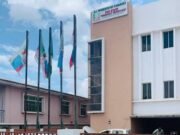With the coronavirus pandemic hindering learning activities across the world, the Development Agenda for Western Nigeria (DAWN) has taken a bold step to help pupils in the South western part of Nigeria.
The commission yesterday officially announced partnership with a non-governmental organisation, Ibironke Adeagbo Foundation, to bring about digital education through electronic learning.
Soon, DAWN would start the distribution of electronic learning devices to pupils across South West states.
The disclosure was made yesterday by the duo of Mr Diran Famakinwa and Mr Seye Oyeleye, trustee of the foundation and director general of DAWN respectively who addressed a press conference at the commission’s office at Cocoa House, Dugbe, Ibadan.
Explaining that the closure of schools across Nigeria has changed the landscape of education, the duo added that the current situation means that pupils cannot continue to stay at home without finding a way for them to continue learning, adding that the device, which comes with preloaded school syllabus in reading, writing and mathematics, will bring education to the people at the lowest affordable cost, especially for those that are currently not able to continue their education and who are not from high affluent families.
According to Famakinwa, the foundation decided to partner DAWN commission because they were both working towards ensuring that majority of children who cannot afford the kind of data and electronic means to link up with their schools continue their education.
He said: “Fortunately the two organisations are thinking along the same line and we saw good examples in Europe. Europe had free internet access and broadband. We’ve caught the bug of what DAWN commission is doing.
“Lagos State pioneered some mobile devices that come with six preloaded school syllabuses as well as the data credit to be able to make sure that the children while they are remotely at home were able to continue their education .So, in partnership with DAWN, we decided that everything that happened in Lagos, we need to share that broad knowledge across the whole South West region. We invested in purchasing these devices that would be shared across the other states that have not been able to use this and we would be working with them to get a feedback.
“We would be handing them over to the
DAWN commission because they have a better logistics to make sure that these get to the true end user. The device is for every child and it comes with preloaded school syllabus as well as the credit. We feel this is a step in the right direction for those children that are currently not able to continue their education and we believe that even When the schools resume which we certainly hope as soon as the government is able to do deal with all the issues.”
Famakinwa said that the need for a remote education will have to continue because things have changed and the kind of education before COVID-19 will not be sustainable going forward.
“The children will still have the need to be able to remotely access their school and be able to continue their education. We are really delighted thay we can work in partnership with DAWN on this,” he said
He appealed to other stakeholders in the education sector, such as philanthropists, clubs, religious organisations and societies to assist in making sure that “we can filfill more of these devices so every child in the states will be able to have this and it would become a basic educational material just like the pen, pencil.That is what we want.”
Speaking, Oyeleye said everybody know that the future of education is digital, adding that the future only suddenly arrived with COVID-19. He noted that the aim of introducing the device was to ensure that no child will be left behind because of pandemic.
“In the quest to make sure that everyone is carried along, we said let us have an irreducible minimum of digital education soon the kids will have access to. Because we know that we can’t afford the high end digital education that is being provided In Europe, we then look at our own peculiarities and say that how can we bring this education to the people at lowest affordable cost.
“So we have to be creative in the ways and manners we can accommodate all our children. How do you get the child in the towns and rural places connected so they don’t miss out on classes. Our pupils had gone home for months and we realised coronavirus is not going to go tomorrow morning and we are not just going to put the kids at home without finding a way for them to continue learning and we live in a part of the world where data for digital education is not that easy to come by. How do we then move forward to make sure that our children at home at thoroughly educated.
“We know without deceiving ourselves that vast majority of our pupils don’t have that luxury of a device and internet. Does that mean we now neglect them? If you neglect them, you are neglecting your future. Here at DAWN commission, our job is to think ciritcally even for the states,” Oyeleye said.
The DAWN commission DG said apart from Ibironke Adeagbo Foundation, the commission also have one or two other organisations that it is working actively with on the digital education.
He added that the device will not be free but at the same time it will be very affordable for the states, reiterating that, “what we are saying is how can we make it easily accessible? It means that the states need to invest in it. It is something they can easily afford.
“It is partnership. It is preloaded and there is data on it. Our thinking is long term. We are talking to those who will give us the devices and data, even the content providers are not left out. The aim is that no child will be left behind because of pandemic. We shouldn’t say because some kids can’t go to school, then they are left behind. If we do that we are creating trouble for our immediate future,” he said.
Oyeleye stated that how states will implement the use of the device would be down to the peculiarities in each state.
“A lot of things is being done to ensure that our children are adequately educated during this pandemic,” he added.


































